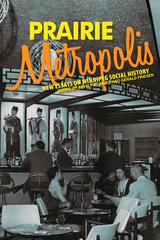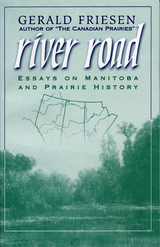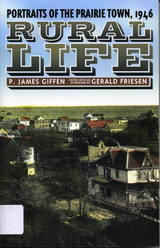6 books about Friesen, Gerald

A Guide to the Study of Manitoba Local History
Gerald Friesen
University of Manitoba Press, 1981

The Honourable John Norquay
Indigenous Premier, Canadian Statesman
Gerald Friesen
University of Manitoba Press, 2024

Mac Runciman
A Life in the Grain Trade
Paul D. Earl
University of Manitoba Press, 2000
One of the most turbulent periods in the history of prairie agriculture is chronicled in a new book about the life and times of Alexander "Mac" Runciman, the Saskatchewan farmer who led the United Grain Growers as president from 1961 to 1981. Mac Runciman earned the respect and admiration on both sides of the great agriculture debates of the 1960s and 1970sófrom individual farmers to Pierre Trudeau, who offered Runciman a cabinet post in 1980 (Mac turned him down).Mac Runciman: A Life in the Grain Trade tells the story of how Runciman rose through the ranks of the UGG to play a central role in the fierce debates over the modernization of grain handling, subsidized freight rates, and the role of The Canadian Wheat Board. Runciman's reminiscences give new insights into the events and personalities of that critical period in Canadian agricultural history, a time in which the rural community began to question highly centralized and regulated marketing and transportation systems. The events and decisions of those years continue to reverberate in today's controversies over grain marketing and grain transportation.
[more]

Prairie Metropolis
New Essays on Winnipeg Social History
Esyllt W. Jones
University of Manitoba Press, 2009
At the turn of the twentieth century, Winnipeg was the fastest-growing city in North America. But its days as a diverse and culturally rich metropolis did not end when the boom collapsed. Prairie Metropolis brings together some of the best new graduate research on the history of Winnipeg and makes a groundbreaking contribution to the history of the city between 1900 and the 1980s. The essays in this collection explore the development of social institutions such as the city’s police force, juvenile court, health care institutions, volunteer organizations, and cultural centres. They offer critical analyses on ethnic, gender, and class inequality and conflict, while placing Winnipeg’s experiences in national and international contexts.
[more]

River Road
Essays on Manitoba and Prairie History
Gerald Friesen
University of Manitoba Press, 1996
The prairies are a focal point for momentous events in Canadian history, a place where two visions of Canada have often clashed: Louis Riel, the Manitoba School Question, French language rights, the 1919 Winnipeg General Strike, and the dramatic collapse of the Meech Lake Accord when MLA Elijah Harper voted “No.”Gerald Friesen believes that it is the responsibility of the historian to “tell local stories in terms and concepts that make plain their intrinsic value and worth, that explain the relationship between the past and the present.” For local experiences to have any relevant meaning, they must be put into the context of the wider world.These essays were written for the general reader and the academic historian. They include previously published works (many of them revised and updated) from a wide variety of sources, and new pieces written specifically for River Road, examining aspects of prairie and Manitoba history from many different perspectives. They offer portraits of representatives from different sides of the prairie experience, such as Bob Russell, radical socialist and leader of the 1919 General Strike, and J.H. Riddell, conservative Methodist minister who represented “sane and safe” stewardship in the 1920s and 1930s. They explore the changing relationship between Aboriginal peoples and the “dominant” society, from the prosperous Metis community that flourished along the Red River in the 19th century (and produced Manitoba’s first Metis premier) to the events that led to the Manitoba Aboriginal Justice Inquiry in the 1980s.Other essays consider new viewpoints of the prairie past, using the perspectives of ethnic and cultural history, women’s history, regional history, and labour history to raise questions of interpretation and context. The time frame considered is equally wide-ranging, from the Aboriginal and Red River society to the political arena of current constitutional debates.
[more]

Rural Life
Portraits of the Prairie Town, 1946
James P. Giffen
University of Manitoba Press, 2004
In the 1940s, the Manitoba Royal Commission on Adult Education investigated directions for the modernization of the province in the post-war era of change. It was charged particularly with looking at rural Manitoba’s cultural, educational, and leadership opportunities in the wake of new technologies, dwindling populations, and altered political and social affiliations. The commission engaged Jim Giffen, then a young sociologist from the University of Toronto, to undertake a detailed field study of three rural Manitoba towns in this context.Giffen’s extensive study examined the towns of Carman, Elgin, and Rossburn, all significantly different in terms of their ethnic makeup and level of political and organizational sophistication. He remained in the province for a year and a half, at the end of which his report, an analysis of “education for leadership,” was considered “too revealing” for public release. It remained in the Ontario Legislative Library until it was retrieved, 50 years later, by well-known historian Gerald Friesen, who has written an extensive postscript to the report.As a snapshot of rural agricultural life in prairie Canada at a time of great change, the study is invaluable. Despite the differences in the three towns, they retain some common characteristics that define a particular socio-cultural view of the larger world. Giffen looks at characteristics such as leadership in the community, ethnic differences, hierarchy of roles, participation in organizations, and aims and activities of young people. Friesen’s postscript provides a wider context to this study, and an assessment of what these differences and commonalities meant to the province.
[more]
READERS
Browse our collection.
PUBLISHERS
See BiblioVault's publisher services.
STUDENT SERVICES
Files for college accessibility offices.
UChicago Accessibility Resources
home | accessibility | search | about | contact us
BiblioVault ® 2001 - 2024
The University of Chicago Press









